Puokpeh, Mandamon, and Work and See Farmers’ Cooperative Groups Decry Poor Irrigation Construction Works Under SADFONS project in Southeastern Liberia
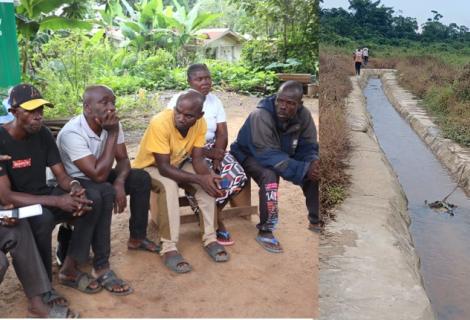
The three farmers’ cooperative groups raise their concerns during a series of focus group discussion with an assessment team from ActionAid Liberia.
As the dry season gradually sets in, farmer from the Mandamon, Puokpeh, and Work and See Corporative Farming Groups in Grand Gedeh and River Gee Counties benefiting from the Smallholder Agriculture for Food and Nutrition Security (SADFONS) Project say, they are deeply worried about the survival of their rice farms given the delay and poor construction of the irrigation system on their farms.
The three farmers’ cooperative groups raised the concerns during a series of focus group discussion with an assessment team from ActionAid Liberia. The team is currently conducting an impact review of the SADFONS project under the Global Agriculture and Food Security Program (GAFSP) in both Grand Gedeh and River Gee Counties.
As part of efforts to help farmers adapt to the growing impacts of climate change and transition towards more sustainable agroecological farming practices, one of the key components of the SADFONS project, implemented by Liberia’s Ministry of Agriculture was the constructure of irrigation systems. These systems were intended to provide a consistent water supply to rice fields, enabling farmers to cultivate rice year-round, but the farmers say that has not been the case.
The SADFON project valued at approximately US $19.08 million aimed to strengthen food and nutrition security for smallholder farmers across all the 8 counties the project is being implemented.
However, with just two years remaining for the SADFONS Project conclusion, farmers from the three cooperative groups say the rehabilitation of the irrigation infrastructure which include the peripheral bunds, and canal systems remain incomplete. In some areas, they report that the work already done is of poor quality, which has led the Ministry of Public Works replacing the engineering company (Eagle Construction company) originally contracted to carry out the work in Grand Gedeh.
“The rehabilitation work on that farm is just around 50%, and because of that, this year must of us were not able to farm well because the water gave us problems.” Varnie Kanneh, the chairperson of Work and See Farmers Corporative in ELRZ Community said.
Experts say, effective irrigation system is critical to ensuring farmers crops survive in the midst of the daunting impacts of climate change. Consistent water supply for ensuring crops grow well even when rainfall is unpredictable. Most importantly, it reduces the risks of crops and helps largely in maintaining food security and steady farm income.
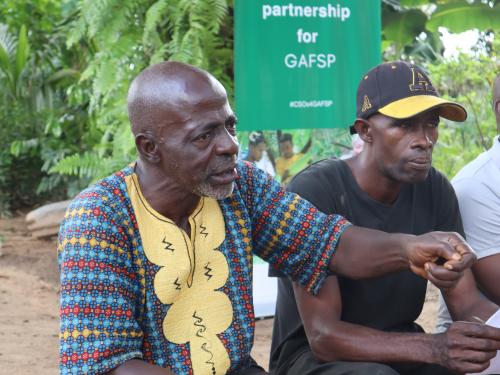
Farmers from the Puokpeh, Mandamon, and Work and See Cooperatives all report facing similar challenges. They say their rice plots are not receiving adequate water from the main drain canal connected to the peripheral bunds. The system which is supposed to regulate water flow and at the same time drain excess during periods of overflow, has not been functioning properly.
Farmers Complain that the inland canals pipes are blocked and that water is not being supplied regularly to their fields. They say their farms now rely solely on the rainfall, raising fears that as the dry season approaches, their rice crops may not survive.
In Jarkaken, Chedepo district, the leaders of the Puokpeh Corporative Mr. Gbogbeh Doe told the assessment team that Eagle Construction Company the firm initially hired for the irrigation work did not deliver on the expected outcome, as a result a new engineer was brought in to lead the project, but the new engineer claims the reconstruction has been delayed due to heavy rains.
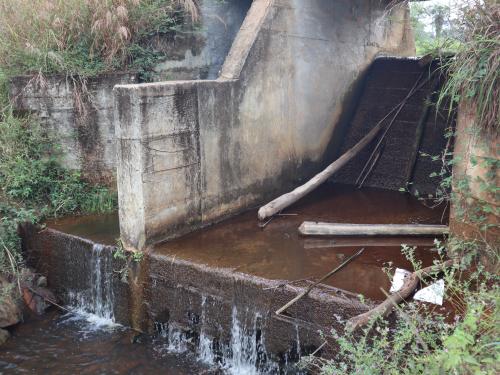
Talking about other challenges in addition to the water structure issue the group is facing, lead farmer Doe further said the only power tiller donated by SADFONS to the group has also been down for prolong period, thereby affecting the farmers production and cultivation.
“The power tiller used to speed up our work in the field, because it tills the soil faster than us using our hands and hoe, but we are facing a problem with the power tiller because our swamp is really deep, so we have put in for drum sealer to help us.”
Puokpeh like many other farming groups benefiting from SADFONS, the group said they received 10 bags of 25kg Suakoko 8 and 15 bags of 25kg Narica L-19 seed rice which was distributed to all 50 members of the corporative.
Across the three farming corporative groups, Puokepeh, Work and See, and Mandamon corporative said they want to cultivate more rice to feed their towns, but given the prevailing challenges, and the limited time left for the end of the SADFONS project, they fear that their dreams could be far from over.
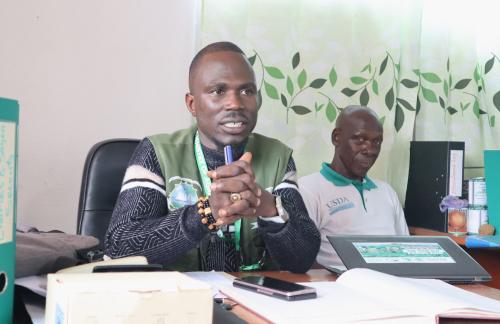
Tweh emphasized that with the low land farming and if the proper water control and supply systems are put into place, given the two brands of seed rice given to the farmers -the Narica L-19 and Suakoko 8, farmers could harvest three times within a year’s time, which he added could boost food security not just in River Gee, but throughout the southeast and particularly in SAFONS Project communities.
The incomplete irrigation system rehabilitation and poor handling of the work, Tweh said needs to be given serious attention by the SADFONS project management team which sits at the Ministry of Agriculture in Monrovia.
“Agriculture is time bound, and the only thing we pray for is that the low land that they are rehabilitating should be properly developed, and once it’s properly developed the farmers will remain there.”
The incomplete irrigation system rehabilitation and poor handling of the work, Tweh said needs to be given serious attention by the SADFONS project management team which sits at the Ministry of Agriculture in Monrovia.
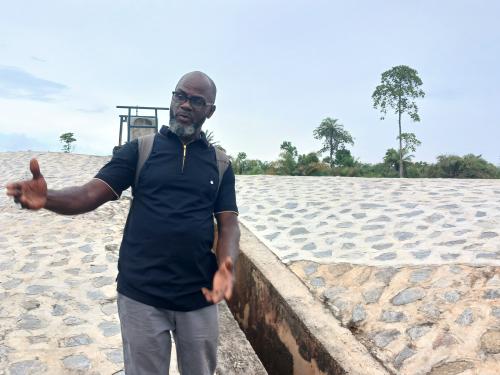
They named low land development, farmers can now cultivate rice at least two times a year, and the training lead farmers received which the skills are expected to be reciprocated to other farmers within the corporative groups.
About the GAFSP Impact Review of the SADFONS project
The Global Agriculture and Food Security Program (GAFSP) established by the G20 leaders in 2009, officially rollout in April 2010 benefiting over 36 countries with a financial portfolio of $ 2.44 billion United States Dollars supporting 320 private and public sector projects in low-income countries.
The impact review is being conducted in collaboration with civil society consortium, in 5 other countries including Liberia. The civil society consortium is being led by ActionAid International together with the Eastern and Southern Africa Small-Scale farmers Forum (ESAFF), Asian Partnership for the Development of Health Resources in Rural Areas (AsiaDHRRA), AND COORDINATION POUR DES Actions en Sante et Development d’Haiti (COSADH).
This civil society consortium is assessing a selection of the Global Agriculture and Food Security Program (GAFSP) grant-funded project.
These reviews focus on gathering lessons learned, documenting successes, as well as challenges and exploring opportunities to scale up sustainable agriculture and how the GAFSP projects are addressing the link of climate, nutrition, income generation, and gender within the agriculture and food systems.
The assessment is samutineosuly being carried across 6 countries, Liberia, Tazania, Asia (Cambodia Laos) and Latin America, and Carribean (Haiti), Burundi, and DRC.
The overall objectives of the review assessment is to explore how projects have reached or are working towards their states specific project objectives, how well they are addressing the crosscutting themes, and key consideration and as well exploring how the projects include CSOs, Pos, and the different approaches used by Ses in engaging the farmers and understanding the power dynamics and well as their contribution to improving community-level food security and wellbeing more generally among other things.